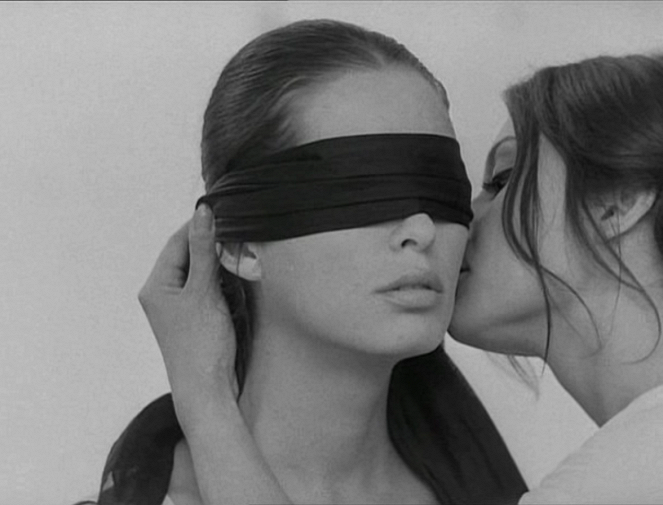Directed by:
Alain Robbe-GrilletScreenplay:
Alain Robbe-GrilletCinematography:
Igor LutherComposer:
Pavol ŠimaiCast:
Jean-Louis Trintignant, Sylvia Turbová, Zuzana Kocúriková, Július Vašek, Ivan Mistrík, Jozef Čierny, Dušan Blaškovič, Jozef Kroner, Ivan Letko (more)Plots(1)
On the run from pursuing soldiers, Boris (Jean-Louis Trintignant) finds a refuge in a small European town which, years before, was home to Jean, a resistance fighter hunted by the Nazis. Boris ingratiates himself in the community, weaving tales of his encounters with the martyred rebel, and thereby seducing Jean's widow.. and sister... and maid. But Boris's erotic games are interrupted when a mysterious stranger -- who may, in fact, be Jean -- arrives in the village. (Redemption)
(more)Reviews (3)
I remember how during the times of true socialism, an unnamed regional museum organized an exhibition dedicated to the local partisan movement during the occupation. They even invited a former Soviet commander to the opening in order to strengthen the inseparable brotherhood of our two nations. The old man looked puzzled at the yellowed photographs that adorned the walls of the two large halls. "Who are these people?" he asked in confusion. - "They are your comrades-in-arms, our heroic partisans." - "Have you gone mad? If I had that many men, I would have driven Schörner out of the Protectorate myself," came the indignant response. This small but characteristic anecdote from the recent past can well illustrate the fact that lies and manipulation have been, are, and will be an integral part of Czech lives, sometimes having the power to shape a virtual reality. Lies as a film theme, therefore, provide a wide range of possibilities, and it's just a matter of how to approach the subject. Imagine, for example, several versions of the same event from the perspective of different actors (which Kurosawa has already worked with) and it would be up to the viewer to discover where the truth lies. Most directors would try to play a sophisticated game with the viewer, gradually unsettling them with subtly revealed hints in their initially unequivocal view of events, and giving them hope that they might eventually unveil the great mystery and the real state of affairs. Grillet approaches things differently. The viewer doesn't interest him because, for him, the film itself is a toy, so he delightfully plays with its form for his own pleasure. From the first few minutes, you know that the main character with an unclear and, above all, changing identity is a pathological liar. Which of his versions and faces is the real one? Probably none of them - and in the end, does it even matter? There are no fixed points of reference. You can only shake your head incredulously as to why the director forcibly inserted posing beauties with striking modern makeup into a World War II story as if they had stepped out of sleazy erotic films with a lesbian theme from that era. Or why the camera lingers so lovingly on the white background. Depending on your nature, you can consider the film either a refined artistic experiment or an affected self-centered authorial pose. I don't deny that the cinematography and the presence of the reliable Trintignant are worth appreciating, but otherwise, it's a disaster. I probably wouldn't find common ground with Grillet even in a debate about the weather. Overall impression: 25%.
()
Both of Alain Robbe-Grillet's Slovak-French films are considered crucial in the era of the search for an independent identity of Slovak cinema. However, even with the hindsight of years, one cannot think that every national cinema should have made a representative of every contemporary genre and thus proved its viability. The random images of Robbe-Grillet are interesting perhaps only because of the participation of Jean-Louis Trintignant, a classic of French cinema. Seemingly familiar stories from the era of the Slovak state are illustrated by shots with Ivan Mistrík, but their veracity disappears whenever one of the foursome of Kocúriková, Turbová, Bréal or Prado appears on the scene. Naive mannerism.
()
The power of a novelist lies precisely in the fact that they invent in absolute freedom, without any model. Modern prose has one remarkable feature: it deliberately emphasizes this characteristic to such an extent that invention and imagination ultimately become the plot of the book (A. Robbe-Grillet, “For a New Novel,” p. 23, essay from 1957). By replacing the words prose and book with the word film, we have a description of this film. Just like any artistic fiction is a lie, this film is also a lie, with the difference being that it is too powerful, too much for the ordinary viewer who wants to be mesmerized by a merciful lie - a comprehensible story - for 90 minutes (nowadays 120 minutes). Robbe-Grillet dissolves the process of creating a lie = plot into the film itself. Another thing is the endless coquetry of present and past, lies and (always only provisional and current) truths within a single sequence, creating a unique and peculiar synchrony of Grillet's films.
()

